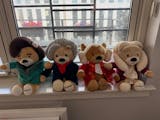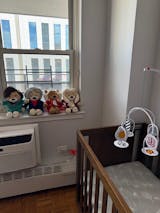Role-playing toys are not simply playthings; they are essential tools inchild development. From the moment a child picks up a toy and begins to imagine, a world of learning unfolds. These toys encourage children to create, act out scenarios, and step into various roles, providing a dynamic platform for growth and discovery.
When a child engages in role-playing, they do more than entertain themselves — they develop critical thinking, problem-solving skills, and emotional intelligence. Each scenario they create is a new challenge that requires them to think on their feet,
communicate their ideas, and respond to the unfolding story.
This type of play is active and involved, pushing children to use their brains in unique and complex ways.
Role-playing toys stimulate a range of developmental milestones across cognitive, social, and emotional domains. They allow children to explore relationships and personal interactions, which are key components of social learning.
Through the lens of imaginative play, children learn about themselves and the world around them, setting the stage for empathetic interactions and a deeper understanding of complex social dynamics.
Unlocking the imagination through role-play
From the moment children begin to engage with role-playing toys, they embark on a journey of limitless imagination. Whether they're pretending to be doctors, teachers, or superheroes, kids use these toys to create scenarios that propel their narratives.
This form of play is vital as it enhances cognitive flexibility, allowing children to navigate between various thoughts and actions swiftly. It encourages problem-solving and decision-making skills by presenting children with challenges that they must overcome within their imaginative play.
Role-playing with toys likemusical stuffed bears or dolls prepares children for real-world interactions through the safe confines of play. It teaches them the basics of social interaction and emotional management.
For instance, when children pretend to host a tea party or navigate a superhero's journey, they learn to cooperate, take turns, and express empathy and understanding toward imaginary friends or fellow playmates.
This kind of play not only sparks creativity but also builds narrative skills. As children invent situations and outcomes, they develop their ability to tell stories. This is crucial for literacy as it enhances their understanding of narrative structure and vocabulary.
Role-playing allows children to step into the shoes of others, fostering a deeper understanding of diverse perspectives and emotions. This is particularly impactful when children take on roles that differ significantly from their everyday lives, expanding their worldview and increasing their capacity for compassion and empathy.
Boosting language and communication skills
Role-playing toys significantly impact language development. As children narrate their adventures, dialogue with characters, or articulate rules in their games, they build vocabulary and improve their language structures.
This active engagement in storytelling enhances their communication skills, which are crucial throughout their educational journey and beyond.
Musical toys add another layer of interaction. When children incorporate musical stuffed bears or instruments into their play, they enjoy the auditory stimulation and learn to associate sounds with actions, which boosts their auditory processing skills and enhances their understanding of language rhythms and cues.
Role-playing encourages children to engage in more complex conversational scenarios, often mimicking adult interactions, including problem-solving, negotiating, and reasoning.
This type of imaginative play is instrumental in developing their ability to understand perspectives and intentions, key components of effective communication. As they direct the narratives or assume different roles, they also practice adjusting their language and tone to fit various social contexts, enhancing their social communicative competence.
Emotional and social intelligence through play
The benefits of role-playing toys extend deeply into emotional and social intelligence. By assuming different roles, children experiment with a range of emotions and responses.
They learn to understand and articulate feelings, foundational in developing empathy. For instance, caring for a musical stuffed bear might lead a child to comfort it, mimicking nurturing behaviors they see in adults.
This type of play also teaches children conflict resolution. They learn negotiation and compromise as they navigate disputes in their imaginary worlds — maybe two characters want the same toy or disagree on the story's direction. These are vital skills in real-life interactions and relationships, underscoring the importance of role-play in social and emotional development.
Children's involvement in role-playing scenarios where they interact with others helps build teamwork and leadership skills. They often take turns leading various aspects of their play, whether organizing a group activity or directing a play scene with friends. This shared experience bolsters their confidence and enhances their ability to work cooperatively in a group setting.
Engaging in these dynamic social exchanges sharpens their understanding of social cues and the subtleties of human interactions, which are crucial for healthy emotional and social development.

Strengthening fine motor skills and coordination
Role-playing toys often require manipulation, whether it's dressing a doll, moving a toy car, or simulating a tea party. These activities are excellent for developing fine motor skills. As children button a doll's shirt or arrange tiny tea cups, they enhance hand-eye coordination and dexterity.
Including musical toys in role-play can also develop motor skills as children learn to manipulate the instruments, understanding cause and effect through tactile feedback.
Engaging with role-playing toys encourages children to refine their spatial awareness as they navigate different setups, whether it's a makeshift classroom or a mini kitchen.
This type of play aids in understanding spatial relationships and distances, which are critical for cognitive development and everyday tasks. The physical aspects of setting scenes and organizing spaces foster an appreciation of order and sequence, further bolstering their ability to plan and execute tasks effectively.
Cultural awareness and diversity
In a globalized world, understanding and appreciating cultural diversity is more important than ever. Role-playing toys that represent different cultures and backgrounds can be powerful tools in teaching children about the world.
Through play, children explore variouscultural norms and practices, which can foster a sense of global citizenship and cultural sensitivity from a young age. Musical toys that include sounds from different world cultures can enrich this learning.
Children become familiar with and appreciate global musical styles, which can be educational and delightful, enhancing their cultural awareness through auditory exploration.
Introducing role-playing scenarios involving festivals, traditions, or daily routines from around the world deepens children's insights into diverse lifestyles. Such activities encourage children to ask questions and seek information about the different ways people live and celebrate, broadening their perspectives.
This kind of play educates them about inclusivity and teaches respect for differences, helping to lay the groundwork for a more empathetic and culturally aware generation.
The lasting impact of role-playing on child development
The influence of role-playing toys on child development is profound and enduring. By engaging in imaginative play, children develop critical cognitive, social, and emotional skills that form the foundation of their future learning and interactions.
These toys entertain and educate, making them invaluable in any child's developmental toolkit. As parents and educators, choosing toys that support these aspects of development—such as role-playing sets and musical toys — is crucial in providing children with the resources they need to grow into well-rounded, empathetic, and intelligent individuals.
Remember, each play session is more than simply fun; it's a stepping stone to greater developmental achievements.
A quick recap
Role-playing toys offer more than amusement; they lay a foundation for a lifetime of learning and understanding. As children imagine themselves in different roles, they acquire valuable life skills that are crucial as they grow and interact with the world.
Each pretend play session is a step towards building confident, creative thinkers who will navigate social situations with empathy and insight. Encouraging children to engage with role-playing toys supports their development in ways that traditional toys cannot match.
These toys spark imagination, foster language skills, and promote social abilities through cooperative play. They prepare children for future academic challenges and teach them about the nuances of human emotions and relationships.
As parents and educators, it's our responsibility to provide children with opportunities to explore their potential through play. By integrating role-playing toys into their playtime, we equip them with the tools to succeed and thrive in diverse environments.
Let's give our children the gift of play that educates, enriches, and enlightens their young minds, preparing them for the many roles they will play throughout their lives

Dive into the enchanting world of Virtuoso Bears
Virtuoso Bears is where each cuddly bear enriches the lives of youngsters with the sounds of classical music. Each bear carries forty minutes of meticulously selected melodies that go beyond mere amusement; they actively support the cognitive and sensory growth of young minds.
Every Virtuoso Bear is a gentle introduction to music, providing bedtime comfort and stimulating play engagement. They are more than mere toys; these bears are lifelong companions that foster a deep love for music, all nestled within the cozy embrace of a teddy bear.
Ideal for any occasion where gifts are exchanged,Virtuoso Bears deliver a profound musical experience, creating cherished memories for children as they grow, embrace, and adore their melodious friends.


